Dell XPS 15 L521X: A Detailed First Look
by Jarred Walton on July 25, 2012 1:10 AM ESTDell XPS 15 General Performance
We start as usual with our general performance application benchmarks. We’re reaching the point where we now have quite a few notebooks in our updated Mobile Benchmark suite, and we’ve tried to select some reasonable comparison points. Given the preliminary nature of our benchmark results (i.e. potential for CPU and/or GPU throttling), we have not yet added the XPS 15 to Mobile Bench, but we will do so when we have a final release BIOS that addresses our throttling concerns. Here’s the list of laptops we’ll be using for our charts, along with a brief overview of their specs. The full specs for each laptop can be found in their respective reviews, which we’ve linked in the table below.
| Laptop Configuration Overview | ||||
| Laptop | CPU | Graphics | Storage | Battery |
| Acer Aspire V3-571G | Intel i7-3610QM | GT640M/HD4000 | HDD | 48Wh |
| Acer Aspire S5 | Intel i7-3517U | HD4000 | SSD | 35Wh |
| Acer TimelineU M3 | Intel i7-2637M | GT640M/HD3000 | SSD | 55Wh |
| AMD Trinity Prototype | AMD A10-4600M | HD7660G | SSD | 56Wh |
| ASUS N56VM (Prerelease) | Intel i7-3720QM | GT630M/HD4000 | HDD/SSD | 56Wh |
| ASUS G74SX-A2 | Intel i7-2630QM | GTX560M/HD3000 | SSD | 90Wh |
| Clevo W110ER | Intel i7-3720QM | GT650M/HD4000 | Hybrid (Seagate) | 62Wh |
| Dell XPS 15 (L521x) | Intel i7-3612QM | GT640M/HD4000 | Hybrid (SRT) | 65Wh |
| Razer Blade | Intel i7-2640M | GT555M/HD3000 | SSD | 60Wh |
| Sony VAIO SE | Intel i7-2640M | HD6630M/HD3000 | HDD | 49Wh |
| Toshiba P755D | AMD A8-3520M | HD6620G | HDD | 47Wh |
We have quite a few SSD-equipped laptops in our list, which will mostly influence PCMark results. The Dell XPS 15 we’re reviewing marks the first time—and certainly won’t be the last!—we’ve had a laptop arrive with support for Intel’s Smart Response Technology. Previously SRT was only available with the desktop Z68 chipset, but with the new Ivy Bridge Panther Point chipsets (see the chipset table at the bottom of our IVB Ultrabook review) laptops with 7-series chipsets (excluding the HM76) all support SRT. Dell uses a Samsung P830 32GB mSATA SSD for SRT caching, and we enabled the higher performing “Maximized” mode with write-back caching as opposed to the lower performing “Enhanced” mode with write-through caching. There is an increased risk of data loss in the event of hardware removal or failure, but HDD removal is highly unlikely to occur on the XPS 15 and in the case of hardware failure there’s already a high chance of data loss. (We always recommend users back up, and back up often!) Note that a system crash doesn’t cause data loss—the Intel BIOS hooks detect an improper shutdown with “unsaved” data in the SSD cache, and that data is then committed to the hard drive on the next boot—it’s actually quite slick.
The other hybrid storage solution that we’ve seen more often is Seagate’s Momentus XT, which has an 8GB cache that AFAIK only functions in write-through caching mode. Going forward, we’ll also see some laptops using alternative caching schemes like Diskeeper/Condusiv Technologies’ ExpressCache software. I do have a laptop undergoing testing right now with an 8GB ExpressCache implementation, and it appears to be less performant than a 32GB SRT cache, but given the discrepancy in SSD size it’s difficult to come to any firm conclusion at this point.
Now let’s get to the benchmark results, starting with PCMark. We ran the XPS 15 in both IGP and dGPU modes, as the presence/lack of Intel’s Quick Sync technology can have a sizeable impact on overall performance according to this metric. We’ve used the best score for each chart on previously testing laptops (e.g. IGP for the Computation results). The XPS 15 results are in green, with the similarly equipped Acer V3-571G results in yellow. We also have results for the ASUS N56VM/N56VZ prototype with both HDD and SSD (light blue) storage, so you can get a feel for the range of performance that the storage solution creates. Note that while the overall design is highly reminiscent of Apple’s current MacBook Pro 15, we do not have current MBP15 Boot Camp results—and anecdotally it appears there is very little cross shopping; people either want an MBP with OS X, or something else with Windows. If/when Anand or Vivek gets around to testing the latest MacBooks with Windows, we’ll add the results to Mobile Bench.
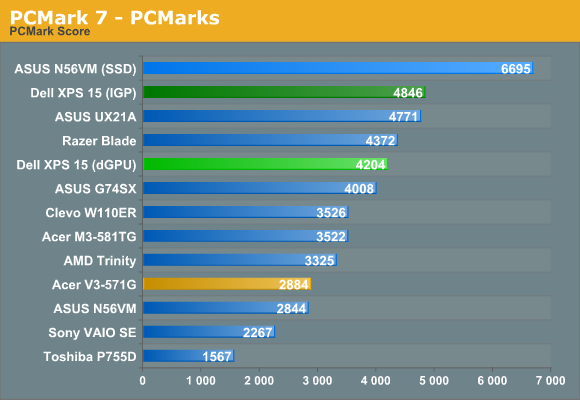
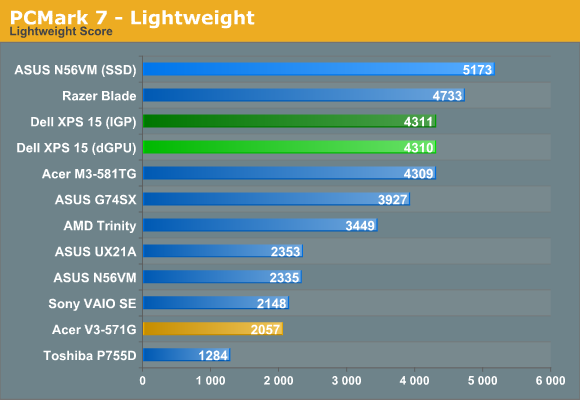
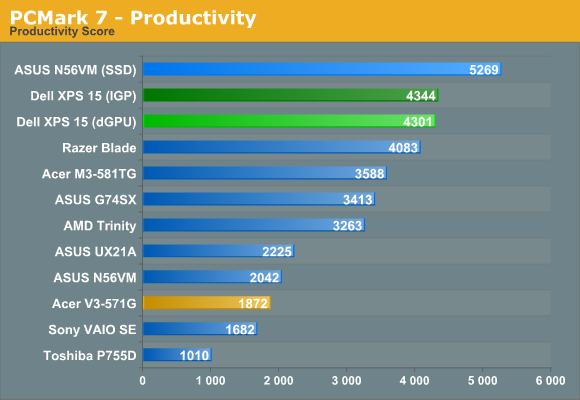
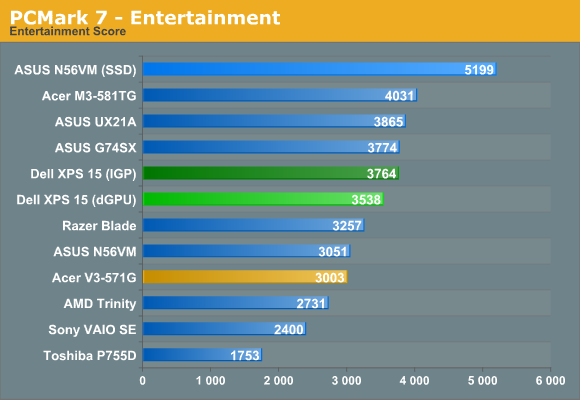
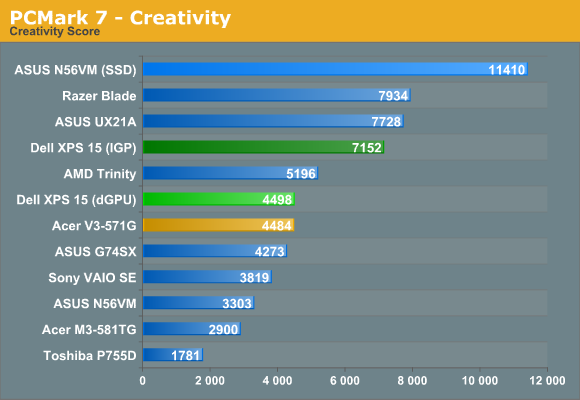
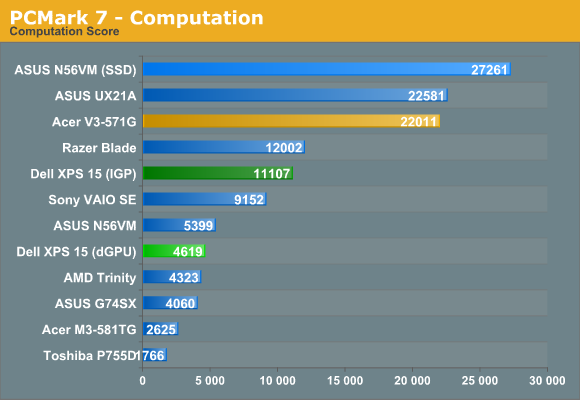
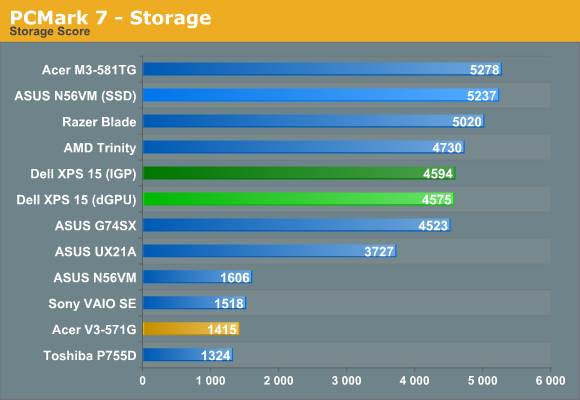
Starting with PCMark 7, our results are actually somewhat surprising. The hybrid Seagate Momentus XT storage in the Clevo W110ER doesn’t improve scores all that much over a typical hard drive (if you can call 25% “not that much”), whereas the 32GB SRT solution in the XPS 15 looks to improve performance by around 75% over an HDD. Of course, if you make the switch to a pure SSD solution (e.g. look at the N56VM scores), PCMark 7’s overall score improves by 135%. That pretty much establishes the expected storage hierarchy: SSD > HDD + SSD Cache > Hybrid HDD > HDD.
There are a few other oddities in the PCMark 7 results worth noting. Both the Creativity and Computation suites benefit tremendously from Intel’s Quick Sync technology. For whatever reason (we tried both the 2696 and 2761 Intel drivers, with similar scores in both cases), the XPS 15 results don’t seem to be in line with other Ivy Bridge laptops. In particular, note how the other three IVB laptops (N56VM, UX21A, and V3-571G) all post Computation scores in excess of 20000, while the XPS 15 has to “make do” with a score of only 11000. This may be yet another instance where throttling is affecting the results, so we’ll wait for updated firmware before trying to draw any final conclusions.
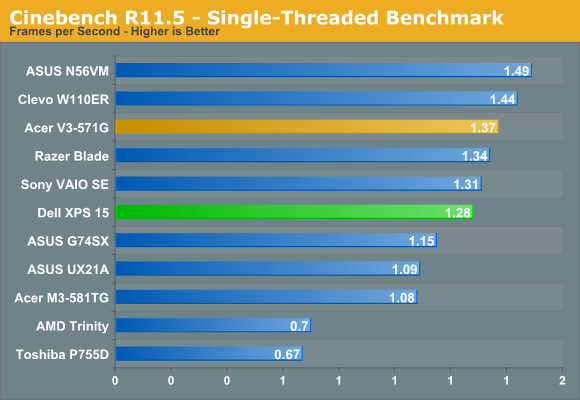
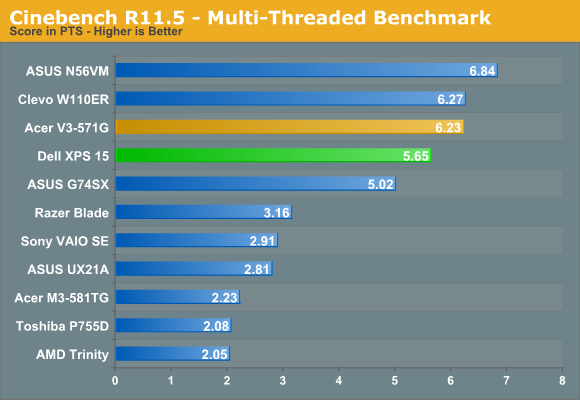
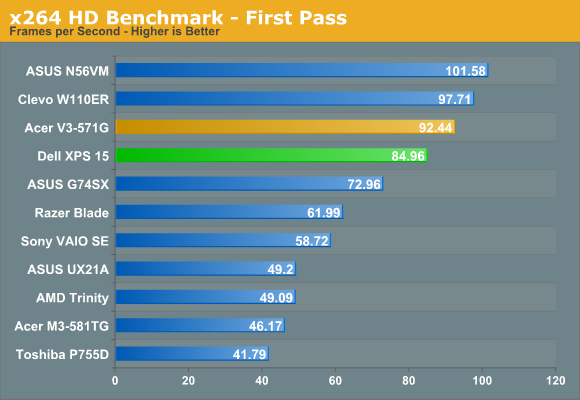
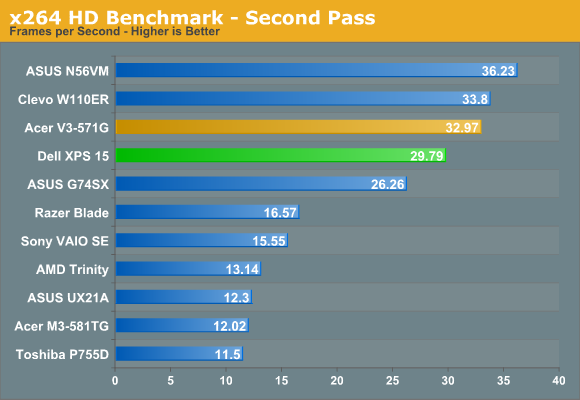
Our CPU-centric tests put the XPS 15 and its 35W i7-3612QM right about where you’d expect. It’s faster than any dual-core processor and outperforms the quad-core Sandy Bridge chips, but it’s a slight step down from the standard voltage 45W IVB quad-cores. Throttling of CPU clocks did not occur during these tests, so it’s only when the CPU and GPU are carrying a significant load the throttling is triggered. As far as we can tell, with the current A04 BIOS, the Dell XPS 15 can pretty much loop a workload like the Cinebench SMP test indefinitely and remain at the maximum Turbo Boost clock (though that may change with updated firmware).
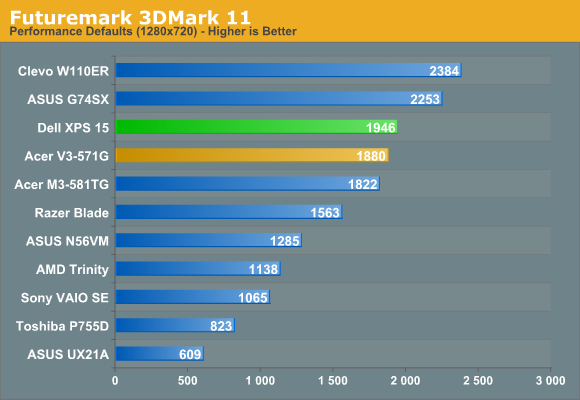
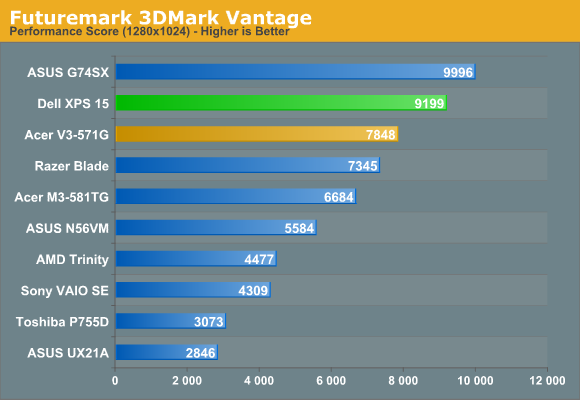
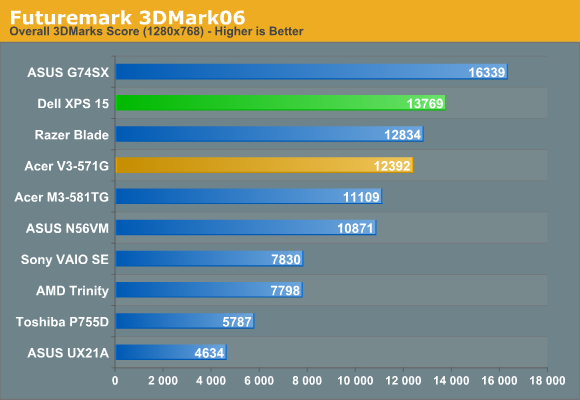
3DMark results also put the XPS 15 and its GDDR5-equipped GT 640M right where you’d expect. It’s a step up in performance over the DDR3-equipped GT 640M in the Acer V3-571G, and it also beats the previous generation GT 555M in the Razer Blade. Meanwhile, the GTX 560M can still win in our synthetic graphics tests, and the GT 650M with GDDR5 also outperforms the XPS 15. There are no real surprises here, but as noted several times already, throttling may be affecting these results—and it’s definitely a factor in the gaming results, which we’ll get to next.










109 Comments
View All Comments
tipoo - Wednesday, July 25, 2012 - link
It just seems strange that they would ship a laptop which throttles in just minutes, this isn't even a super small ultrabook, it's a standard sized laptop. Maybe there's a problem with the physical seating of the heatsink? Or a BIOS issue maybe?JarredWalton - Wednesday, July 25, 2012 - link
They're working on the BIOS. I wondered about the problem being specific to my unit as well, but there are a lot of users reporting similar issues right now so that doesn't seem to be the case.dragosmp - Thursday, July 26, 2012 - link
Thanks for the reply. I missed the point of it throttling only when using both CPU and GPU.It makes sense that they'd size the cooling for a "typical" TDP and not for the 100%TDP. This is usual practice when sizing cooling systems for high end products, by the same rationale you'd get a huge ugly stuff if one were to size the cooling radiators for a Ferrari for the airflow @20MPH New York traffic without the ECU reducing power. It is form over function and I would prefer to have the cake and eat it too, but this perfectly acceptable in my opinion. I probably misread that one can't use the CPU by itself without throttling, that would be unacceptable.alfling - Thursday, July 26, 2012 - link
lol you can't play 10 minutes without throttlestop...acceptable? whith that price??CeriseCogburn - Sunday, July 29, 2012 - link
The point is "fanboys". Thus it will be marketed and sold.nerd1 - Wednesday, July 25, 2012 - link
I've been a fan of anand site but I think it's getting bit ridiculous.I don't think this laptop will have lot worse thermal compared to MBP or rMBP - Why I cannot see any 'torture' test on MBPs, like bootcamp + CPU benchmark + GPU benchmark? Many of my friends have MBP and I know they are toasty enough, and some reviewer reported throttling issue with rMBP with such a test.
And please compare apple to apples. How much apple charge for RAM or HDD upgrade? (It is plain stupid they are still using 5400rpm drive I think) How much does it cost to get SSD+HDD setup or blueray drive for macbooks? How much does it cost to upgrade macbook screen to 1680*1050? How easy is it to get discount coupons for them?
In practice, you can get a good windows laptop (like the new xps 15) at around $1200 (with easy-to-acquire coupons) and you have to pay full retail price of around $2000 for similarly spec'ed macbook pro 15. I do own a MBA (Which I think is still price-competitive) but all the MBP lines are just plain ripoff.
JarredWalton - Wednesday, July 25, 2012 - link
Give me a break. I am one of the least pro-Apple people around, as I really dislike OS X -- just ask Anand. I do a price comparison on the front page showing how they stack up and conclude that in many areas Dell has the lead. What about throttling on Apple laptops? Well, sadly I'm not the one doing MBP reviews so I can't run those tests. What I can tell you is that Vivek repeatedly ran HL2:EP2 on the latest MBP15 to see if there was any drop in frame rates:http://images.anandtech.com/doci/6037/MBP12-HL2End...
If I made a chart like that for the current A04 BIOS on the XPS 15, there would be a cliff after the first run, dropping from 160FPS to around 80FPS. But hopefully Dell can address that with the next BIOS. Will MBP15 throttle under a stress test workload? I'm almost sure it will, but perhaps not as badly as the XPS 15 right now. What about the Retina MBP? Well, that's a different beast with two fans and apparently significantly improved cooling, and early results suggest it doesn't have any issues with throttling.
Apple makes some very compelling laptops, but ultimately the only reason I would ever consider one is if I were willing to run OS X. I'm not, and thus laptops like the XPS 15 are very much something I want to succeed. A bit more fine tuning and hopefully Dell will get there, as the throttling is the biggest issue I have right now. (The only other major complaint I have is the good but not great LCD.)
nerd1 - Wednesday, July 25, 2012 - link
I just wanted to point out macbook are way more expensive in practice.And I don't think HL2:EP2 is a good benchmark for throttling - I'm pretty sure even internal graphics are sufficient to run them flawlessly these days. One german site used bootcamp and prime95 and they succeeded to make rMBP throttle at 1.2Ghz.
headbox - Wednesday, July 25, 2012 - link
How about doing a RESELL price comparison?! You whine about Apple MBP cost, but in 2 years you can sell it for around 80% of what you paid for it, and tons of people will bid/call you about it. Sell a two-year-old Dell... that phone won't be ringing much, and you'll be lucky to get 50% of what you paid for it. I had the first gen unibody MBP- got it for $1800 and sold it 2.5 years later for $1500 within a couple hours of posting it on craigslist. Try to do that with a "cheaper" PC.alfling - Thursday, July 26, 2012 - link
Someone who buys a 2-year-old used laptop for 80% of its original price (whatever laptop it is) is just a total idiot, no doubts about this. I guess it's full of idiot apple customers out there